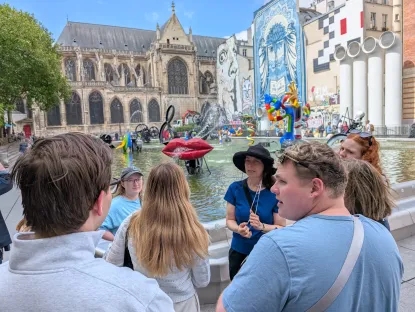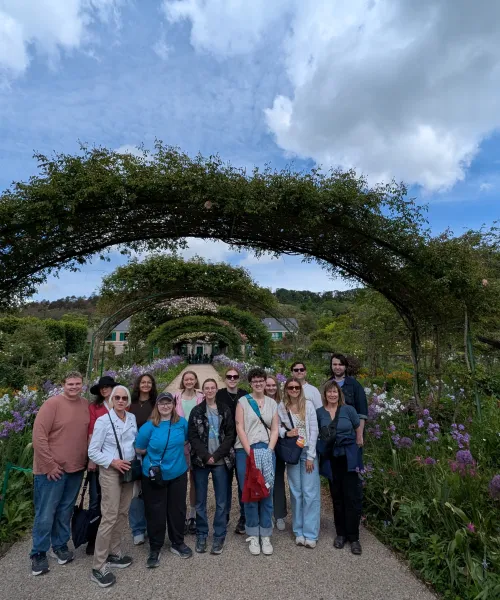Paid Internship in France and Student Teaching in France for Education Students
Très Chic French Fan Gear

Activities brought to you through Academic Service Learning (ASL) by students of the French program
- The French Table meets weekly when classes are in session. For the specific time and location, contact the Department of Languages, Literatures and International Studies.
- Languages and Culture Exhibit: Language and culture exhibits at the Childrens' Museum.
- French Camp for Young Learners provided elementary school children with some basic knowledge of the French language and culture.
- French Mentoring Program for beginners in French at NMU
Superior Edge - All classes in the Department of Languages, Literatures and International Studies can be applied toward Superior Edge.
French Club - The French Club meets weekly when classes are in session. For the specific time and location, contact the Department of Languages, Literatures and International Studies.
The NMU French Program provides a wide curated selection of award-winning French and Francophone films to be viewed at the warm and pleasant atmosphere of the Department of Languages lab, Languages Resource Center. Several people can view a selected film together with multiple headsets that plug into the same player. The language lab is open during specified hours for the duration of the fall and winter semester classes. Please check for lab hours by calling the Department of Languages, Literatures, and International Studies at 227-2940. For any other questions, please contact Dr. Nell Kupper at nkupper@nmu.edu.
La Table Française (The French Table)
By Dr. Nelly Kupper, Professor of French
The French Table is an informal French conversation group and a social gathering, held weekly. The French Table was organized at the beginning of Fall semester 2000. It is open to students and people in the community who want to speak French and/or who are interested in French and Francophone culture, language, and literature.
Although the meetings are informal, the French Table is a productive and effective learning experience. It is hosted by upper-level students as part of their Academic Service Learning activity. Each student hosts two evenings during the semester. The student plans engaging topics they want to introduce for discussion and presents them to their professor over a phone call prior to the meeting. After the session the student reports back to the professor, detailing the events of the evening.
In spite of the effort the students must put into this activity, they seem to enjoy it tremendously. Many attend on regular basis, without meeting any requirement or receiving extra credit. April Spray says: “[La] Table Française has become a social event! It’s a great way to practice without any pressure and to learn more by correcting each other.”
Abbie Pesola adds that: “The French conversation table ... is a great place to freshen up on your French Conversation skills, and take part in some great, relaxing, fun, and exciting discussions. We talk about all sorts of things, the company is great ... While participating and listening to others, you pick up on things, catch errors, learn new phrases, correct yourself, and expand your knowledge ... Classes are important part of the learning process, but this is the place to truly see and enjoy the reasons we all take these classes.”
Liz Day is very grateful that “the whole thing [got] started.” She says: “It gives us, as classmates, a chance to get to know each other outside of class, from that, I feel that I have built some wonderful friendships. La Table Française allows me to use my language skills outside of class. It allows me to practice my conversational skills in a non-intimidating environment ... I truly look foreword to Wednesday nights.” Louis Taccolini shares Liz’s sentiment in saying that “it places us in another environment, different from the classroom, and also allows us to meet new students.”
Come join us in these informal meetings where you can have a glimpse into the French culture through occasional slide presentations, discussions about people’s experience in France and other Francophone countries and even meet native French speakers who live in our community.
French Camp for Young Learners offers elementary school children some basic knowledge of the French language and culture. Michigan requires foreign language for high school graduates. This hands on Academic Service Learning project provides cross-cultural appreciation and contrast, promotes interest in future language study, and integrates foreign language study with social studies, language arts, music, math, fine arts, and other areas of elementary education. The camp takes place over four days, each for the duration of the class period of Intermediate French. The curriculum is as follows. Day one is for “Discovering Ourselves and Our Friends”—greeting, leave-taking, presenting ourselves to each other, and associated cultural gestures; “Our Body and j’ai mal”. Day two is for “Objects Around Us and Likes and Dislikes, J’aime and Je déteste”—the classroom, at home, leisure and sports; and arithmetic—numbers and equations 1-12, +/-/=.
Day three is for “French Cuisine”—using basic cooking vocabulary, measurements, counting off amounts of items (eggs, croissants, cups of flour, sugar, milk, etc.), likes and dislikes, hot and cold (segue into climate), and learning important foods, meals, and customs associated with French culture. Here the elementary student will have to improvise a rudimentary conversation in French, recombining the expressions learned, to receive what they desire in the café.
Day four is for “Fine Arts,”—using basic art vocabulary of shapes and colors, familiarity with some important art aesthetics (Realism, Impressionism, Post-Impressionism, Naturalism, Cubism, Surrealism), familiarity with major artists (Millet, Monet, Renoir, Cézanne, Seurat, Van Gogh, Braque, Magritte), and familiarity with Paris museums and other Parisian monuments. A virtual tour, including geography and visual art, concludes the French Camp, as a whole class activity. The tour takes students from their elementary school, expanding from their city to their state, to the North American continent, flying across the ocean to the European and African continents, viewing the surrounding countries and Francophone areas, then zeroing in on France, then Paris. Once in Paris, we take time to view the map, and the location of the well-known monuments, which we view one at a time, as we progress along the designated route. We arrive to our final destination, the Musée d’Orsay, and examine selected paintings of studied artists therein. Pausing on each painting, a pair of Intermediate student leading the tour identify the name of the artist, the title of the painting, and encourage elementary students to identify the colors, shapes, and objects they have learned in French. Here the elementary students eagerly shout out the words they have learned.
The challenge is to create a curriculum that would have the right combination of rigor and accessibility for elementary learners. We have to generate a list of vocabulary for children who may have never heard a foreign language before and may even be resistant to learning one. This means that we have to accomplish two items. First, select the right kind of vocabulary with some cognates. Second, generate the right amount of vocabulary so as to provide a complete lesson to allow students to communicate with each other in French, but not too extensive as to overwhelm them. Also, the factor of “fun” was essential in order to spark enthusiasm at the very beginning, and also maintain that enthusiasm for four days of camp. Likewise, it is hard work for students to take the role of teachers who have to show patience, compassion, and persistence in leading the young learners to feel success in the end of the camp.
Students of French at NMU have the opportunity to review and improve their French in a cross-disciplinary approach, combining cultural learning with different fields of study, such as math, cuisine, fine arts, and geography, and to plan a way to teach it to small children. NMU Students benefit by reviewing their linguistic skills and cultural knowledge and sharing some of their skills with young learners. This opportunity provided NMU students with a rewarding experience of helping others learn and in turn provides meaning to their own learning. In the course of the French Camp, elementary students express authentic enthusiasm in discovering that they are learning, and can actually express themselves in French. With its early exposure, in a fun and engaging way, this project gives elementary students a leg up in some vocabulary and cultural knowledge of French, creating interest, and virtually eliminating the anxiety and fear sometimes associated with the study of foreign language in the United States. Studying French early also sparks enthusiasm in the young children for learning about other cultures and languages. When the elementary students are much older and face the potentiality of taking a foreign language, we hope that they will remember this moment in their past, and will consider the possibility with enthusiasm rather than trepidation. The French Camp for Elementary Schoolchildren is, therefore, a small step toward the strides elementary students will have to make to be productive citizens in the modern world that is becoming more and more internationalized.
Students of FR 201 and 202 Intermediate French Language courses, meet students of FR 101 and 102 Elementary French Language courses, each semester for mentoring sessions, three or four depending on the size of the classes. Students in the intermediate course, who act as mentors, advance their skills in French language and culture and read critically French literary texts at their level. It is useful for them to share the knowledge they gain with student mentees, who are embarking on their studies of French at the elementary level of language. An important part of the mentoring sessions involves assisting the mentees with ideas and development of their educational display for the Upper Peninsula Children’s Museum, an Academic Service Learning activity for elementary French levels.
Intermediate students, because they have chosen to continue studying French, have explored French films, prepared French recipes, learned how to study better in a foreign language, and have explored ways in which French would be useful to them in their careers, continued studies, and graduate school. Intermediate students benefit from the French Mentoring Program because they must prepare for the mentoring sessions with the beginners in French, by reviewing grammar, elements of their learning of French culture, language, and the applicability of their learning to career and future studies. The knowledge gained from intermediate students is in turn useful to the first-year students, most immediately in the classroom, in their decisions with the educational displays for the Children’s Museum, and in their plans for their distant future. Collaboration with student colleagues is particularly motivating to both mentors and their mentees. To share knowledge is the most effective way to learn the material and to make learning a memorable experience. Through the French Mentoring Program, both students in the second year and in the first year have a chance to better internalize information about French language, and culture, and then to share this knowledge with the community at large through the educational displays at the museum.
